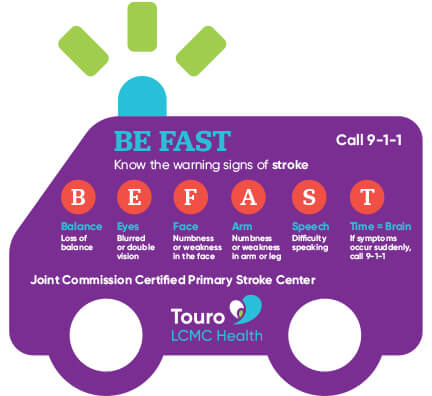What to know about a Transient Ischemic Attack (TIA)
Transient Ischemic Attack (TIA) - some refer to it as a "ministroke" but it is in fact not a stroke. It is an almost stroke and a warning sign. The same type of process that happens when you have a stroke, happens when you are having a TIA. However, this time you were lucky because the symptoms resolve completely, usually within an hour.
A TIA is not something you should take lightly. Touro Vascular Neurologist, Dr. Sheryl Martin-Schild talks briefly about TIAs and the importance of seeking treatment.
Stroke warning sign
A TIA causes symptoms similar to that of a stroke, but the difference is that TIAs don't cause permanent brain damage and they often last less than one hour, and although very rare, can last up to 24 hours. A TIA is a warning sign and you should seek medical attention immediately, even if you are experiencing minor symptoms. TIAs often come before a full stroke, and they should not be taken lightly.
Symptoms
A TIA and stroke involve many of the same signs and symptoms of a stroke.
- Sudden numbness in your face, arm, or leg, especially on one side of the body
- Sudden confusion
- Sudden trouble seeing, talking, or understanding
- Sudden trouble with balance or walking
- Sudden dizziness or loss of coordination
- Sudden severe headache you can't explain
- Loss of consciousness or seizure
Follow the BE FAST test to help you recognize the signs:

Get treatment
Although the symptoms of a TIA resolve in a few minutes or hours without any specific treatment, it is important that you help prevent another TIA or a full stroke from happening in the future.
RELATED: Take care of your heart
Pay attention to your risk factors
You can control or treat a number of factors — including certain health conditions and lifestyle choices — that increase your risk of a stroke. Having one or more of these risk factors doesn't mean you'll have a stroke or a TIA, but your risk increases if you have two or more of them.
- High blood pressure
- High cholesterol
- Cardiovascular disease
- Carotid artery disease
- Peripheral artery disease (PAD)
- Diabetes
- High levels of homocysteine
- Excess weight
- Cigarette smoking
- Physical inactivity
- Poor nutrition
- Heavy drinking
RELATED: Managing your blood pressure and your cholesterol
After you have received medical attention, it is important to work with a specialist to identify the cause of the TIA and make necessary lifestyle changes, especially if the cause is unknown.


